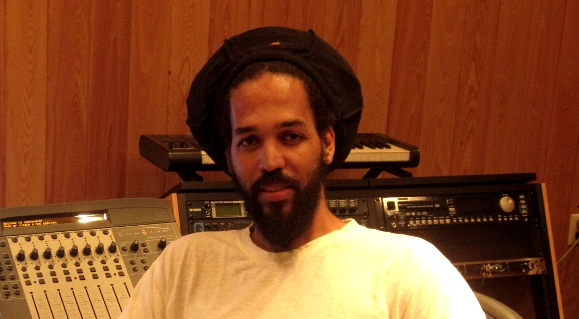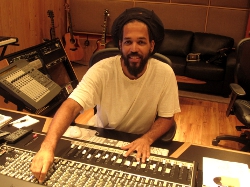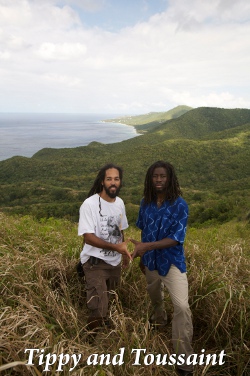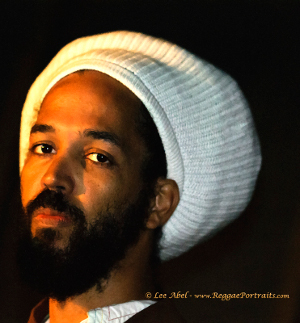Articles about reggae music, reviews, interviews, reports and more...
Interview: Tippy
- Home
- Articles
- Interviews
- Interview: Tippy

Interview: Tippy
"St. Croix is a unique and mystical place. We’ve produced many internationally known artists, thinkers, musicians, writers and athletes"
Sampler

Bright future for VI-reggae
U.S. Virgin Islands has over the last ten years become a powerful force in reggae, especially in the United States. But in Europe the impact has been more moderate. Erik Magni has talked to producer and label owner Laurent “Tippy” Alfred to learn more about the VI-scene.
U.S. Virgin Islands is an autonomous part of the United States, and can best be described as a tourist paradise. The three main islands of St. Thomas, St. John and St. Croix are located in the western Caribbean, just east of Puerto Rico. The largest island – St. Croix – has about 60,000 inhabitants and is the base for a type of reggae which is popularly known as Virgin Islands reggae (VI-reggae).
U.S Virgin Islands are – just like Jamaica – located in the Caribbean Sea. But they have more in common. For example, the Rastafarian movement has been strong on the islands for many years.
− Elder rastamen from the VI will tell you that the Rastafarian movement has been present in St. Croix and St. Thomas since the 30’s, not long after the inception in Jamaica. So reggae, which is rasta music at its core, has been here for a long time, says Laurent “Tippy” Alfred, producer and owner of the I Grade label based in St. Croix.
Started in the 70’s
He says that the first reggae recording in the VI, which he knows of, is Ras Abijah from St. Thomas, who released the album Ras Abijah vs. The Beast in 1979. But there are more pioneers than that.
 − Zeus & the Kasha Heads, The Zioneers, Umojah, Inner Vision and of course Midnite. Midnite was formed around 1989, eight years before they released their first album Unpolished. This crucial first release marked the start of the contemporary VI-reggae scene, Tippy says, and continues:
− Zeus & the Kasha Heads, The Zioneers, Umojah, Inner Vision and of course Midnite. Midnite was formed around 1989, eight years before they released their first album Unpolished. This crucial first release marked the start of the contemporary VI-reggae scene, Tippy says, and continues:
− From there, numerous studios and production houses emerged, like Glamorous Records, Sound VIzion and I Grade.
Midnite is the foundation
Tippy describes the feel of VI-reggae as unique and far more diverse than most people think. For example, there is not only one VI-sound.
− The Midnite sound is the foundation of VI-reggae. So that’s the dominant sound and what most people associate with the VI. Heavy bass lines, slower tempos, live instrumentation, sparse arrangements, bubbling keyboards and stiff guitar skanks.
Something that brings together reggae from VI is that most producers use live instruments, which Tippy considers to be the foundation of classic roots reggae. However, Jamaica seems to have left it behind.
While the VI has a classic reggae sound, it is not reactionary or boring. Tippy lists several producers who he thinks describe VI-reggae.
 − We have Dean Pond’s polished modern roots, Sound VIzion’s upful digital roots and Bambú Station, who produce deep roots.
− We have Dean Pond’s polished modern roots, Sound VIzion’s upful digital roots and Bambú Station, who produce deep roots.
Tippy has a hard time classifying his own sound. He mentions Midnite, but also hip-hop, soul, jazz and British steppers as his influences.
− Overall, I think the lyrical content is what unifies the VI-reggae sound. It is the only reggae movement that I know of where 100 per cent of the artists, so far, are singing conscious lyrics.
Mystical island
For an island with only 60,000 residents, St. Croix has succeeded in producing lots of talented singers and producers. Tippy says that the islands have an abundance of talented artists and it seems that every month a new voice with international potential emerges.
When he tries to explain why there is so much talent, the answer is somewhat puzzling and reminds me of the popular TV-series Lost.
− St. Croix is a unique and mystical place. We’ve produced many internationally known artists, thinkers, musicians, writers and athletes. I think that St. Croix has some of the most creatively talented people on earth. Why is something of a mystery. My feeling is that there are centers of energy in the earth that create and shape minds in a way that modern science cannot grasp, says Tippy and continues:
 − St. Croix must rest upon one of those energy centers. I think there are undocumented reasons why the VI has been so sought after by so many colonial powers in history. That is also why there are so many military installations and radio telescopes located nearby.
− St. Croix must rest upon one of those energy centers. I think there are undocumented reasons why the VI has been so sought after by so many colonial powers in history. That is also why there are so many military installations and radio telescopes located nearby.
He also provides more evident explanations and says that St. Croix has always been a rebellious island and the population is independent of the mind, something he believes fosters musical creativity. He also believes that being a part of the United States he also has had an effect.
− We are a U.S. territory and have a large population from all over the Caribbean. Those who grow up here may be influenced by both the U.S. and the Caribbean. All this cross-cultural mixes makes for a very fertile environment for creative music and arts.
Moderate interest in Europe
Reggae from the VI has had a stronghold on the U.S. mainland for many years, but in Europe, interest has been moderate so far. Midnite and Pressure Buss Pipe are the most successful to date. Dezarie has also received some attention. But not really much more, despite talented artists such as NiyoRah, Ras Attitude and Batch.
− VI-reggae is starting to get wider attention in Europe, but I think it is difficult because artists from here have not received much support from Jamaica. Commercial success in Europe depends on acceptance in Jamaica, says Tippy, and adds that Midnite have managed to break that rule.
Midnite have never had a single in the Jamaican charts. They have never played in Jamaica, but is still respected and loved in Europe. Tippy also highlights the lack of resources as an additional reason.
− VI-labels are small organizations without resources to launch promotional campaigns that penetrate Europe.
“A lot to be hopeful about”
Tippy criticizes some Jamaican artists and believes that dancehall is currently undergoing significant musical changes.
− It is hard to even describe most of the riddims as reggae in any form. They are basically hip-hop/pop arrangements with little originality. It’s nothing like the dancehall in the 80′s or 90’s, that brought a whole new sound to the world, he says and continues:
 − There may be a lot to be disgusted about in contemporary reggae, but also a lot to be hopeful about. Even though artists like Vybz Kartel and Mavado get most of the airplay, there are countless others who spread positivity.
− There may be a lot to be disgusted about in contemporary reggae, but also a lot to be hopeful about. Even though artists like Vybz Kartel and Mavado get most of the airplay, there are countless others who spread positivity.
He is not worried about the future, either for roots reggae in general or VI-reggae in particular. He believes that the contemporary dancehall sound may come and go, but the roots will always remain.
− The key for conscious reggae artists and producers are to adapt commercial and promotional formats so that we can continue to create music that will be heard.
Seven fast ones to Tippy
Favourite artist?
Vaughn Benjamin (Midnite)
Favourite label?
Lustre Kings Productions
Favourite tune?
Handsworth Revolution by Steel Pulse
Favourite genre?
Roots
Favourite producer?
Karl Pitterson
Favourite riddim?
Hard Times
Favourite record sleeve?
A New Chapter of Dub by Aswad
Read more about this topic
Read comments (1)
| Posted by janet on 09.22.2012 | |
| I Zuse (aka Lionel Stout) passed away from this earth this week (Sept 17 in Tortola) He was 59 years old. When i googled his name i saw that either you knew him or knew about him as one of st croix' great musicians. His kids all live in the US and would love to hava any recordings of his music or any lyrics as they have nothing from their fathers life here in this world. If you or anyone else can offer anything about Zuse please let me know. thanks RIP I Zuse...your were one of st croix's great artists. | |
Comments actually desactivated due to too much spams
Browse by categories
Recommended Articles
Latest articles
Recently addedView all
© 2007-2025 United Reggae. All Rights Reserved. Reproduction in whole or in part is prohibited. Read about copyright
Terms of use | About us | Contact us | Authors | Newsletter | A-Z














